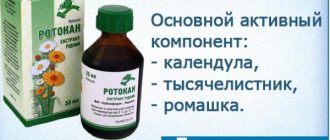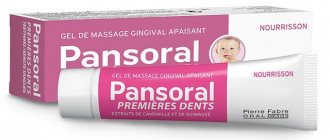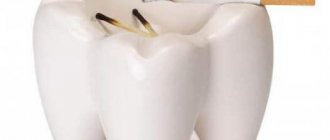Toothache occurs unexpectedly. In the best case, the visit to the dentist will be tomorrow, and all this time you need to endure. And sometimes attacks of toothache occur outside the city or on vacation. In such cases, you cannot do without painkillers. Modern means allow you to quickly and relatively permanently relieve toothaches. In addition, many pain medications are available without a prescription and at affordable prices. Thus, medications for toothache are the most convenient and cheapest way to painlessly wait for a visit to the doctor, where the cause of the toothache is already eliminated.
Content:
- Types of tablets for toothache
- The most popular painkillers for toothache 2.1. Medicines based on nimesulide 2.2. Products containing ketoprofen 2.3. Preparations whose active substance is ketorolac 2.4. Medicines including dexketoprofen 2.5. Medicines containing flupirtine 2.6. Products containing mebeverine 2.7. Medicines containing ibuprofen 2.8. Products containing paracetamol
- When is it okay to use painkillers?
If a tooth aches, it’s difficult to distract yourself from it. The physical discomfort associated with this deprives a person of the opportunity to lead a normal life and forces him to take various medications. Often, to relieve toothache , people take strong drugs for a long time.
It is clear that this approach to the problem cannot be called correct. If there is a need to use a painkiller, then there is a serious dental problem. It needs to be eliminated. Making an appointment with a dentist is the best solution in such a situation. There is no need to look for which pills can help for a long time. Medicines only remove negative symptoms, but do not cure the disease itself. By postponing therapy until later, you can face severe complications and even edentia.
FAQ
Why does toothache occur?
Tooth pain is caused by a number of circumstances and dental diseases. Let's look at them in more detail:
Hyperesthesia
This is excessive tooth sensitivity that occurs when the enamel layer is worn away. Pain occurs when the tooth is exposed to cold, hot or sour food.
Traumatic fractures
When a tooth is injured, part of the crown often breaks off and the nerve is exposed, which leads to severe, often aching pain.
Caries
This is the most common infectious dental disease. Caries gradually destroys the tooth. Often, caries pain occurs in response to eating cold or hot food. If caries is not treated, the tooth is completely destroyed.
Pulpitis
With pulpitis, the patient experiences severe and acute pain. Often attacks of pain occur at night. If pulpitis is not treated, the disease goes into a chronic stage, in which the pain is not so strong.
Periodontitis
This is an acute or chronic purulent inflammation of the periodontium - the tissue around the tooth root. With periodontitis, the patient is bothered by severe sharp pain. If left untreated, periodontitis becomes chronic.
Types of tablets for toothache
There are a lot of medications for teeth. They differ from each other in:
- active substance;
- dosages;
- pharmacological action;
- side effects;
- contraindications.
Each class fights its own “enemy”. Most often, patients in dental clinics are prescribed analgesics. Penetrating into the systemic bloodstream, they minimize stimulation of nerve fibers and prevent the passage of intense pain impulses.
As for antispasmodics, they cannot be called an effective dental pain reliever. Drugs in this group are more suitable for conditions caused by spasm of smooth muscles. They affect the sympathetic nervous system. Relieves discomfort due to disorders of the kidneys, gastrointestinal tract, gynecological pathologies, and migraines. However, with mild pain they can also help.
Many dental clinic clients are prescribed non-steroidal anti-inflammatory drugs (NSAIDs). These are drugs that have antipyretic and anti-inflammatory effects. They quickly stop the spread of inflammatory processes, including in the oral cavity.
Experts' opinion
Numerous clinical studies have proven the therapeutic effect of the Asepta line of drugs.
All focus group patients noted the analgesic effect of the product; after using the rinses, tissue healing was observed in all patients; the hygienic condition of the oral cavity improved in all patients. The products are recommended in the complex treatment of patients, and their availability and ease of use make it possible to recommend them in the clinical practice of dentists[1]. According to the results of clinical studies, after 3 weeks of using ASEPTA® rinse, gum bleeding decreases by 28.3%, inflammation decreases by 32.3% and oral hygiene improves by 33.5%*.
The most popular painkillers for toothache
The list of pharmaceutical developments that effectively cope with negative dental symptoms can include those that contain:
- nimesulide;
- ketoprofen;
- ketorolac;
- dexketoprofen;
- flupirtine;
- mebeverine;
- ibuprofen;
- paracetamol.
Medicines based on nimesulide
This substance belongs to the class of NSAIDs and is recognized as a high-quality analgesic. But it should be used with caution for dental problems, as disturbances in the gastrointestinal tract, allergic and anaphylactoid reactions, swelling, urinary retention, shortness of breath, bronchospasm, and decreased visual acuity are possible.
Nimesulide is prohibited for treatment by children under twelve years of age, persons with bronchial asthma, stomach ulcers, Crohn's disease, and severe renal failure. It is also not suitable for pregnant and lactating women, alcohol and drug addicts.
Products with ketoprofen
Representative of the NSAID group. Shows anti-inflammatory properties. It is produced in the form of tablets, capsules, suppositories, solution for intramuscular and intravenous administration. The compound copes well with acute pain caused by deep caries and pulpitis. But patients with DU, kidney and liver pathologies, and blood clotting disorders should avoid using it.
The age limit for using ketoprofen is 18 years. It is also contraindicated for expectant and nursing mothers.
Drugs whose active substance is ketorolac
They perfectly relieve pain symptoms in diseases of the oral cavity and have a moderate antipyretic effect. The list of contraindications for use includes:
- hypovolemia;
- erosive and ulcerative lesions of the gastrointestinal tract during exacerbation;
- inflammatory bowel pathologies;
- severe kidney failure;
- hypocoagulation;
- kidney diseases.
Patients under 16 years of age cannot be treated with ketorolac.
Medicines including dexketoprofen
Dispensed strictly according to a doctor's prescription. Contraindicated for pregnant women, lactating women, people with diseases of the stomach and intestines, and a tendency to bleeding.
Most often dexketoprofen is well tolerated by patients, but sometimes causes arterial hypertension, skin rashes, bronchospasm, and erosive and ulcerative lesions of the gastrointestinal tract.
Medicines containing flupirtine
These are strong painkillers that fall into the category of centrally acting non-opioid analgesics. They help quickly cope with moderate discomfort in adults. Effective for negative symptoms caused by:
- voluminous carious cavity;
- inflammation of the neurovascular bundle;
- gingivitis;
- stomatitis;
- periodontitis.
Contraindicated for liver disease, alcoholism, elevated levels of liver enzymes, ringing in the ears, and under the age of eighteen. You should not take medications with flupirtine for a long time, as they put a lot of stress on the liver.
Products containing mebeverine
Mebeverine is a myotropic antispasmodic . It prevents the contraction of muscle fibers and eliminates painful spasms. Not suitable for children under 12 years of age.
The product should not be used if you are hypersensitive to any of its components. In general, it has a high safety profile and can even be used by pregnant women (in cases where the expected benefit to the mother outweighs the potential risk to the fetus).
Medicines containing ibuprofen
This active substance can be found in the formulations of Nurofen, MIG, etc. It belongs to the non-steroidal anti-inflammatory drugs. Available in pharmacies without a prescription.
Ibuprofen is very often used for dental pathologies . This is due to the fact that it can be found in everyone’s home medicine cabinet (it is kept there as an antipyretic). The product copes well with pain symptoms of moderate severity. The analgesic effect it provides lasts about seven hours. Effectively relieves inflammation.
But ibuprofen should not be taken if you have stomach problems. It greatly irritates the mucous membranes of the organ, which can aggravate the course of gastric pathology.
Products containing paracetamol
These are the most accessible analgesics and antipyretics. They fight well with moderate painful symptoms. If we compare paracetamol with more popular analogues, it has much fewer side effects. Therefore, it is permissible to use it in the treatment of young children. It can also be taken by nursing and pregnant women.
Nise for the treatment of carious teeth and gums
Nise gel quickly relieves swelling, reduces pressure on the diseased area, and provokes the regeneration of all tissues
Anti-inflammatory ointment of a non-hormonal nature, which quickly relieves swelling, reduces pressure on the diseased area, and provokes the regeneration of all tissues. To eliminate pain, you need to squeeze out no more than 1 g of ointment onto a small piece of sterile material; this is the size of a small pea. Having slightly distributed the active substance throughout the compress, it is applied to the sore spot. For a better effect, you can capture a few adjacent areas, especially with spreading swelling due to severe pain or purulent inflammation. Such applications can also be done 1-2 times a day for 3-4 days. The duration of the procedure is approximately 10-20 minutes.
Attention! Like most ointments for topical use, Nise does not involve applying it to the sore tooth. If possible, the drug should be replaced with tablets or powder with the same name or an analogue. They have a faster effect, and only in rare cases provoke allergies or intestinal disorders.
Video about the drug Nise
When is it okay to use painkillers?
All situations in which it is permissible to combat painful symptoms with the help of NSAIDs can be divided into two large groups:
- recovery period after dental treatment;
- the time before visiting the dentist.
In the first case, you need to take the drug for as long as the doctor said. The dosage and frequency of its use cannot be exceeded. If the composition does not help, you need to consult a dentist about replacing it.
In the second case, a one-time use of an over-the-counter product is allowed. This can be done if it is not possible to get to a doctor today, and the destroyed unit aches very much. But constantly drinking analgesics or NSAIDs, postponing a visit to the dental center, is unacceptable.
Rules of application
In order for medications to have the necessary effect, before using them you need to brush your teeth, rinse and dry your mouth thoroughly, and wash your hands with soap. Apply gels and ointments with your finger, rubbing them into the mucous membrane with a light massaging movement. After this, you should not drink or eat for half an hour. The duration of the therapeutic course is determined by the attending dentist, but usually until the inflammatory and other symptoms disappear.
For preventive purposes, you can use herbal preparations and rinsing solutions. Toothpastes that have proven their effectiveness and are recommended by professionals are useful: Lakalut, Paradontax, President. They should be used for prevention for a month, and then take a break.
Expert opinion . Even the best toothpastes are only preventive measures; they can promote healing, but are not a cure, so if any dental ailments appear, you should consult a doctor, and not try to eliminate them with home recipes: they still won’t help, and any disease will is much more treatable in the initial stages.











